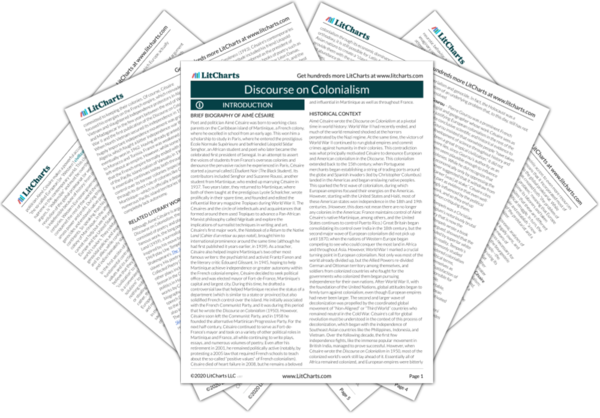Welcome to the LitCharts study guide on Aimé Césaire's Discourse on Colonialism. Created by the original team behind SparkNotes, LitCharts are the world's best literature guides.
Discourse on Colonialism: Introduction
Discourse on Colonialism: Plot Summary
Discourse on Colonialism: Detailed Summary & Analysis
Discourse on Colonialism: Themes
Discourse on Colonialism: Quotes
Discourse on Colonialism: Characters
Discourse on Colonialism: Terms
Discourse on Colonialism: Symbols
Discourse on Colonialism: Theme Wheel
Brief Biography of Aimé Césaire

Historical Context of Discourse on Colonialism
Other Books Related to Discourse on Colonialism
Key Facts about Discourse on Colonialism
- Full Title: Discourse on Colonialism (Discours sur le colonialisme)
- When Written: 1950
- Where Written: Fort-de-France, Martinique
- When Published: 1950
- Literary Period: Contemporary French literature, postcolonial literature
- Genre: Political essay, anticolonial theory, Marxist theory
- Setting: N/A
- Climax: Césaire calls for a global anticolonial, anti-bourgeois revolution
- Antagonist: European colonialism, the European bourgeoisie, academics and the “civilizing mission”
- Point of View: First-person
Extra Credit for Discourse on Colonialism
(In)Dependence for Martinique? Although he called for an international anti-bourgeois and anticolonial revolution in the Discourse on Colonialism, Césaire also famously helped write a bill that helped his native Martinique become a formal department (an entity like a state or a province) of France, rather than an independent country. Some of his followers and students, including Frantz Fanon, were deeply critical of this approach, which they viewed as equivalent to selling out to the oppressor and sacrificing the possibility of political self-determination. Into the 21st century, scholars and Martinicans continue to debate why Césaire chose to advocate for departmentalization over independence and whether his choice was consistent or contradictory with his stance in the Discourse on Colonialism.







